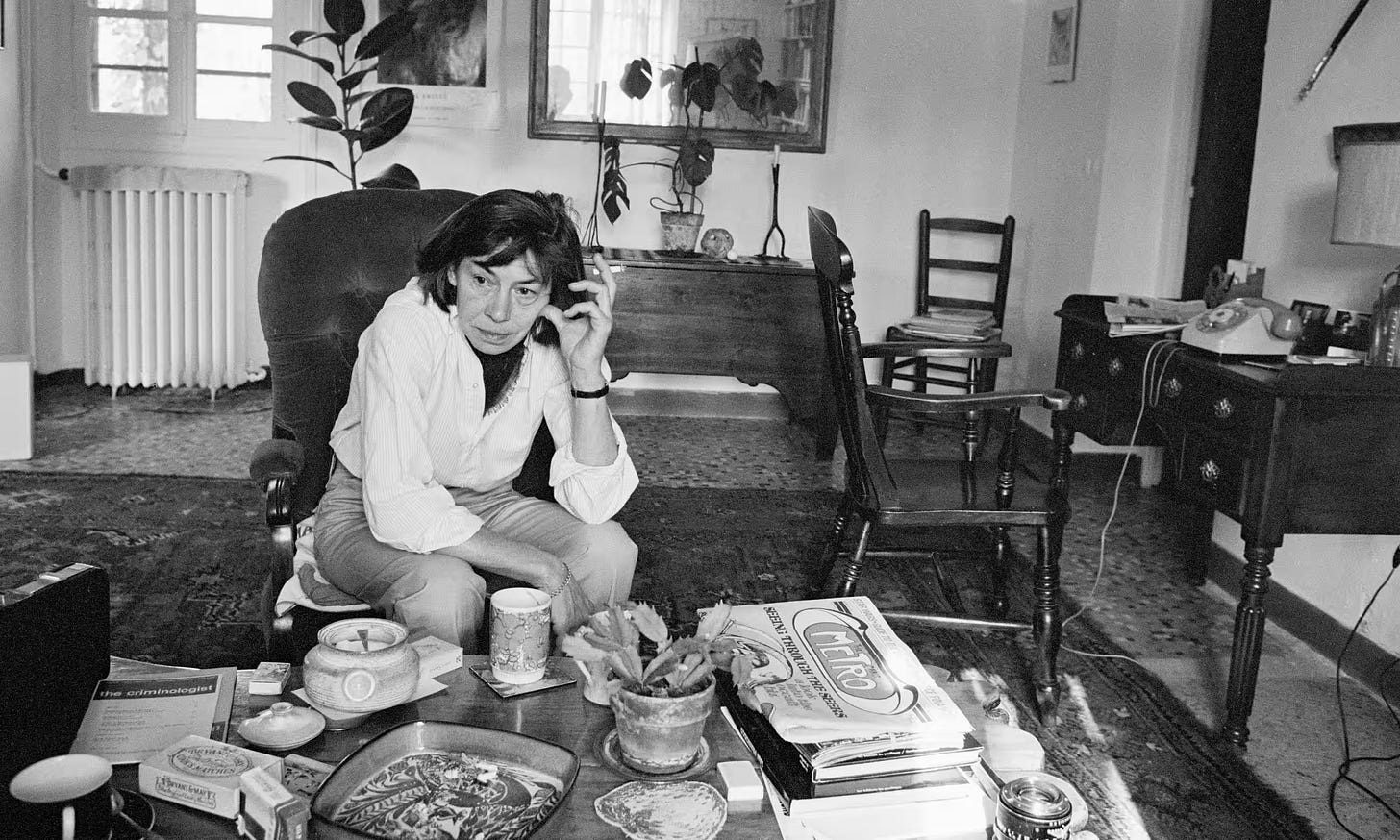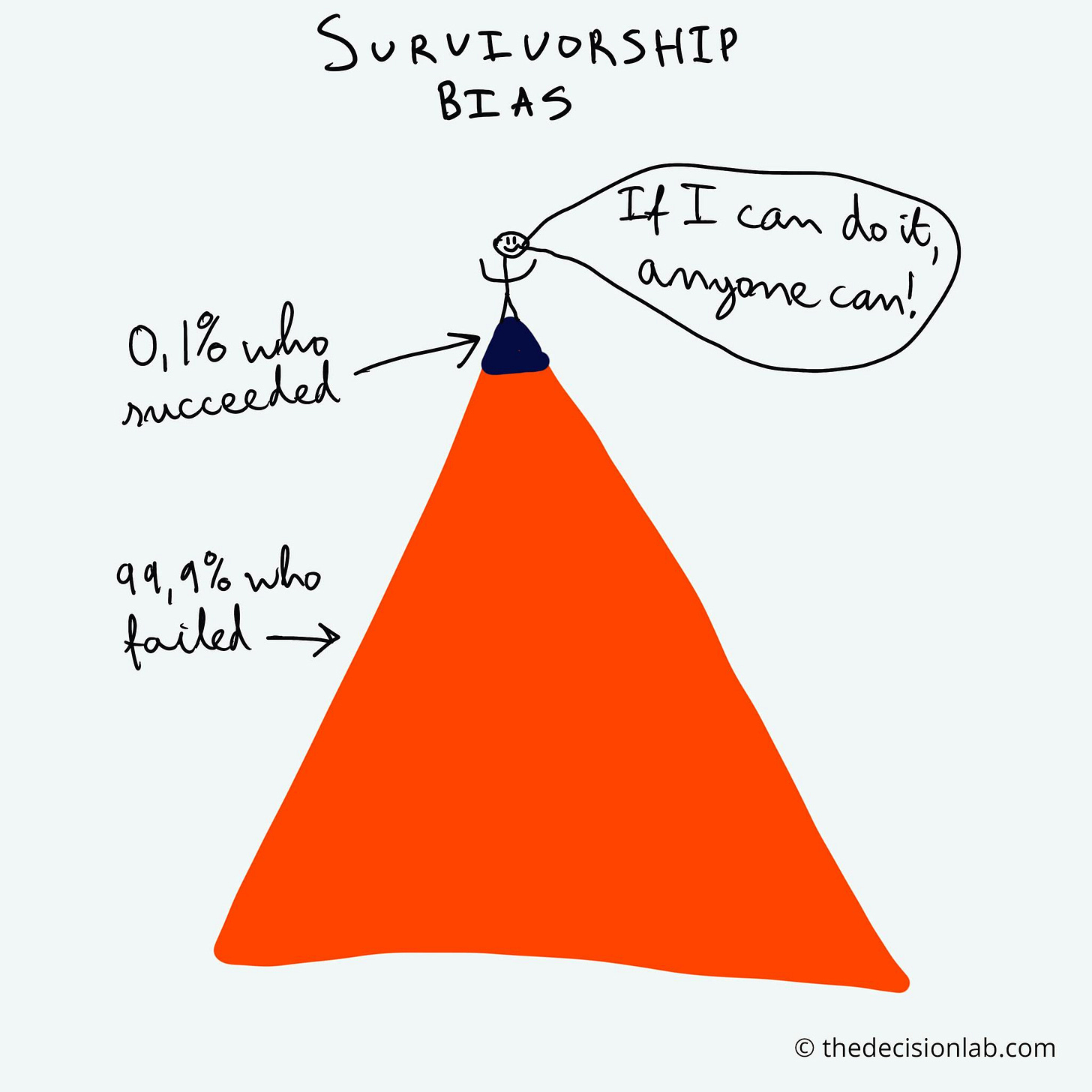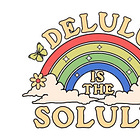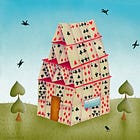☕️ Daily Rituals: Flip or Flop?
On survivorship bias and celebrating quirky creatives’ schedules (or not)
“The best artists are always childish.”
—Patricia Highsmith, author of The Talented Mr. Ripley via her diaries

“[Highsmith’s] favorite technique to ease herself into the right frame of mind for work was to sit on her bed surrounded by cigarettes, ashtray, matches, a mug of coffee, a doughnut, and an accompanying saucer of sugar. She had to avoid any sense of discipline and make the act of writing as pleasurable as possible.”
—Biographer Andrew Wilson in Beautiful Shadow via Daily Rituals: How Artists Work
During quiet mornings with freshly brewed coffee—piping hot, no cream or sugar—I enjoy thumbing through a few pages of ’s Daily Rituals and Daily Rituals: Women at Work.
That means peering into the lives of a small handful at a time of quirky artists and writers, who, thanks to keeping journals or letters, offer up their idiosyncratic routines for our modern gaze. Some pride themselves on being predictable workhorses, others on aligning highly particular criteria to move with their muses; a surprising number relied on stimulants and depressants, and on family members who provided the day-to-day support scaffolding (if not also generational wealth).
The other day while reading, a strange framing exercise occurred to me about these last five years of limbo-land (probably after berating myself for being lazy, at least by late-capitalist Protestant work ethic standards, even though I should know better). If my next book is a smashing success—one can always delulu dream, lol—the last five years might look brilliant in hindsight. If it flops, those judging my actions (or lack thereof) will have been right all along, and proving me to be the dummy my inner critic worries I am.1
A fancier way of saying this is survivorship bias, something I’ve written about before:2
That’s the thing about potentially life-changing risks: they seem insane—and insanely stupid—until they work.
If it doesn’t work, the project ends up in the field of broken dreams, and you are now qualified to speak at places like FailCon or The Failure Ball as a consolation prize.
If the risk does work, you get to ride the survivorship bias train all the way around your victory lap, as audiences and publications the world over celebrate your vision, perseverance, and hard work! If you are gracious, you will chalk a good chunk of it up to luck, including the incredible fortune of where you were born and to whom.
On that note, let us conduct a Sliding Doors exercise for a hypothetical publication, Daily Rituals: Rolling in Doh . . .
🤩 The book is a bestseller!
Blake believes her morning starts the evening prior, insisting on a bedtime so early that in the summer, the sun has barely set, and most people have yet to finish dinner. She sleeps with her childhood teddy bear, Snowflake (now 35), and a blue 15-pound weighted blanket. She rises without an alarm, ideally before the sun, then allows herself two cups of black coffee while reading in the dark with a soft yellow book light, sometimes reading for two hours before moving on to exercise, writing, or taking her German shepherd Ryder out.
After a health scare in summer 2023, Blake now prioritizes wellness above all else, structuring her day around self-care practices. She does this by minimizing meetings and email correspondence, instead spending several hours at “the spaffice,” an expensive luxury gym she declares priceless. While there, she does a mix of strength training, Pilates or yoga, swimming, and restorative practices such as meditation in the steam room. When she heads home, she takes Ryder out again while placing calls to friends or listening to podcasts to spark new ideas. Then she makes linner, usually an enormous salad, and watches TV with her husband before heading to bed and starting all over again.
Blake’s spacious days, free of social media, allow her to focus deeply on her craft, providing her with a thoughtful intellectual foundation that is calm and sturdy, defying the onslaught of attention-decaying TikToks, reels, and infinitely scrolling slop. Blake is a rare gem, almost a relic of an earlier era, and we are grateful for it.
🍌 The book is a mega flop!
Anyone could have seen it coming. With her lackadaisical schedule, it’s a wonder Blake ever gets anything done or has any friends at all. She runs her day like a fragile flower that will wither at the slightest break in routine or critical remark. Even one judgmental glance from a loved one risks sending her into a days-long depression. She emphasizes “quality time” with her husband, himself an incorrigible fine artist, and dog, believing love itself is a type of currency.
Blake is so checked out from the real world that she imagines she’s a fitness influencer (of one—herself), acting as if it’s acceptable to exercise midday while the rest of the world works like responsible adults. Once her glory days were behind her, Blake simply couldn’t adapt to the new world of social media and streaming video. She refused all such content platforms and opportunities for creatives, and, therefore, has nothing to show for her refusal of even common sense. Well, nothing begets nothing!
Although a geriatric Millennial, Blake might as well be part of the Gen X cohort mourning the loss of the creative careers they once thought were possible, if not fruitful. “Get with the times!” her loved ones chided, sometimes only with withering or worried gazes and strained silence when they didn’t want to say it out loud again, “or at least get a job!” Blake’s childish refusal to do so led to documenting her neurosis publicly via her Substack, Rolling in Doh, where she still ekes out two posts a week, in spite of herself.3
Obviously, the second version isn’t very kind. But is it correct? Perhaps if external metrics like money and sales figures serve as the only frame of reference.
They aren’t mine, but sometimes it’s easy to forget.4
❤️
Continue reading part two:
One might also ask: Why do I care what others think or say about me (or to me)?! I don’t know, I wish I didn’t! Maybe because deep down, I’m afraid they’re right. Time to re-read Jamie Varon’s guest post:
The Decision Lab describes survivorship bias as:
A cognitive shortcut that occurs when a successful subgroup is mistaken as the entire group, due to the invisibility of the failure subgroup. The name comes from the error an individual makes when a data set only considers the “surviving” observations, excluding points that didn’t survive.
If you read Wednesday’s post, Breaking Crumbs, by email, you probably missed the quote I forgot to include—relevant for today, too:
“The child is born whole, but then is wounded by life events, each wound splitting off some natural truth and producing a concomitant strategy for survival. Such a split and attendant reflex is more popularly known as neurosis, the split between soul and society that each of us suffers.”
—James Hollis, Under Saturn’s Shadow: Studies in Jungian Psychology
If you enjoyed this post, you might also appreciate:

















Number 2 could be me, Jenny 😂 I'm often found working out in the middle of the day when I 'should' be working and regularly mourn the change of online business.
This made me think of one of the entries in Meditations For Mortals where Oliver observes different a common theme of creatives in history carving out just 3 hours a day for solid work. I was someone who would constantly try to optimise every part of my schedule - and then feel so disappointed when it would fall over either because I wasn't disciplined enough or because... children.
I found this 3 hour thing so helpful. The rest of the day can be given over to life. But for 3 hours, it's work time (sometimes it's only 2 hours or even 1). It's just been a really nice blend of time to concentrate and time for spontaneity (or just a total write off of a day).
Also, I'm curious, how did you find doing this exercise? Was it cathartic? Just asking for a friend...
I love the juxtaposition exercise today. Don’t we all cycle between these two views several times a day? Objectively, Jenny, I think your set daily routine is right for you but also Ryder and Snowflake and Michael. Prioritizing your health and your immediate family will “stand the test of time.” (Cliches last because they are true.) Would Michael be willing for you to write about his daily routine as an artist working in a different medium? Think about the ups and downs in the life of U.S. Grant! He never knew in this life how successful his Autobiography turned out to be. Thank goodness for his family he had Mark Twain to push him to write it before he died.
The reason people read Doh is because you are honest and open with a wry twist to which we happily subscribe.